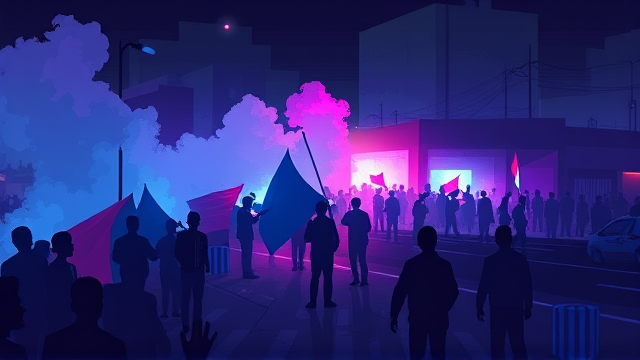Police Fire on Madagascar Protesters Rejecting President's Vow
The crack of gunfire tore through the capital of Antananarivo, a brutal punctuation mark on a day that began with the simmering heat of political discontent and ended with the cold reality of state violence. President Andry Rajoelina, a figure whose political career has been a rollercoaster of populist promises and contentious comebacks, now faces his most severe crisis, one born directly from his own bold, almost theatrical, pledge.Just one year ago, standing before a nation weary of chronic power cuts, crumbling infrastructure, and pervasive poverty, Rajoelina vowed to resign if he failed to materially fix the country's deep-seated problems within a twelve-month deadline—a promise that now echoes with a hollow, tragic ring. The protesters who filled the streets were not merely expressing disagreement; they were there to hold him to his word, to present an invoice on a promise that had spectacularly defaulted.They carried with them the tangible evidence of his failed administration: the empty promises of reliable electricity, the still-unpaved roads that isolate rural communities, the inflation that has made a basic meal a luxury for many. As the crowds swelled, their chants a unified chorus of betrayal, the police response escalated from a defensive perimeter to an offensive onslaught.Witness accounts describe a sudden shift in the air, the deployment of tear gas canisters that bloomed into acrid clouds, sending people scrambling, choking, their eyes burning. Then came the live rounds.The move from non-lethal crowd control to lethal force represents a catastrophic escalation, a decision that will stain the Rajoelina presidency indefinitely and immediately draws parallels to other African nations where leaders have clung to power through brute force. The scenes of chaos—the frantic efforts of makeshift medics, the trails of blood on the asphalt, the wails of the bereaved—are not just a news story from a distant Indian Ocean island; they are a stark lesson in the peril of political gambles.Rajoelina, who first seized power in a 2009 coup backed by the military, has always understood the theater of politics, but this time, the script has spiraled into tragedy. Analysts monitoring the region are now sounding alarms, noting that Madagascar's fragile democratic institutions are being tested like never before.The international community, particularly former colonial power France and regional bodies like the African Union, is placed in a difficult position, forced to weigh condemnations against the strategic importance of the island nation. The immediate consequence is a nation plunged into deeper uncertainty, a populace traumatized, and a political opposition galvanized.But the long-term ramifications are even more profound: the social contract between the governed and their government has been shattered, not just by broken promises, but by the barrel of a gun. The trust required for any future administration to function effectively has been mortally wounded on those streets.For the families of the victims, no political resolution can ever justify the price paid. This is no longer just about a failed year of governance; it is about the fundamental right to assemble, to protest, and to demand accountability without fearing for one's life. The story unfolding in Madagascar is a chilling reminder that when leaders back themselves into a corner with ultimatums, the exit is often paved with violence, and the road to recovery becomes immeasurably longer and more painful for everyone.
Latest News
The political theater outside Westminster Magistrates' Court unfolded with predictable precision Monday morning, as far-right organizer Tommy Robinson—real
29 minutes ago0 comments
In a move that echoes the gravest moments of the Cold War, Britain’s domestic intelligence service, MI5, has issued a stark and unusually public warning to the
59 minutes ago0 comments
In a move that will undoubtedly be recorded by future historians as a pivotal moment in the long and tortured history of the Middle East, President Donald
1 hour ago1 comments
In a move that underscores the deeply personal and often cyclical nature of political influence, Labour has appointed Matthew Taylor, the architect of the
1 hour ago0 comments
In a high-stakes maneuver that recalibrates the geopolitical risk profile of the entire Levant, the long-anticipated prisoner and hostage exchange between
2 hours ago0 comments
The political battlefield erupted this weekend when George Finch, the 19-year-old Reform UK leader of Warwickshire county council and the UK's youngest council
2 hours ago1 comments
In a move that will undoubtedly be dissected by historians and political strategists for years to come, President Trump has formally signed a Gaza peace plan,
3 hours ago1 comments
In a move that will be scrutinized by historians for its geopolitical weight, the initial phase of a Gaza ceasefire deal was formally signed in Sharm
3 hours ago0 comments
It’s quiet here...Start the conversation by leaving the first comment.
